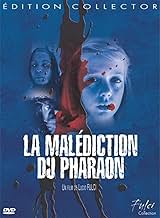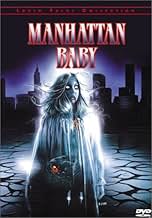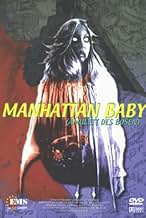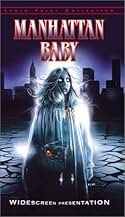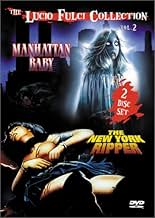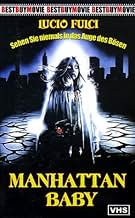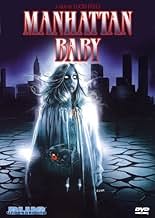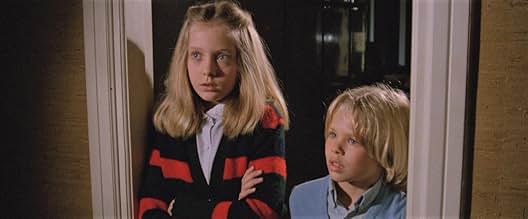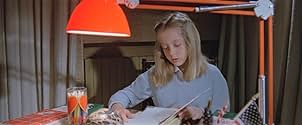IMDb रेटिंग
4.8/10
3.5 हज़ार
आपकी रेटिंग
अपनी भाषा में प्लॉट जोड़ेंAn archaeologist opens an Egyptian tomb and accidentally releases an evil spirit. His young daughter becomes possessed by the freed entity and, upon arrival back in New York, the gory murder... सभी पढ़ेंAn archaeologist opens an Egyptian tomb and accidentally releases an evil spirit. His young daughter becomes possessed by the freed entity and, upon arrival back in New York, the gory murders begin.An archaeologist opens an Egyptian tomb and accidentally releases an evil spirit. His young daughter becomes possessed by the freed entity and, upon arrival back in New York, the gory murders begin.
Laura Lenzi
- Emily Hacker
- (as Martha Taylor)
Cosimo Cinieri
- Adrian Mercato
- (as Laurence Welles)
Enzo Marino Bellanich
- Wiler
- (as Vincenzo Bellanich)
Tonino Pulci
- Orderly
- (as Antonie Pulci)
Martin Sorrentino
- Caretaker
- (बिना क्रेडिट के)
फ़ीचर्ड समीक्षाएं
If you have some acquaintance with other Fulci films, especially the ones from the so-called "Gates of Hell Trilogy", then you know that eyes are, to say at least, a repetitive motive, from the gore set pieces, like the nail killing in "L'aldilà" (eng: The Beyond), to the many eye close-up shots in the dialogue scenes of "Manhattan Baby". Against this general background, this movie can be regarded as a key film. Here, Fulci is somewhat presenting in a very explicit way the coding of the eyes (and The Eye) in his own cinematic style.
While travelling in Egypt with his mother and his archeologist father, a girl receives an ancient medallion representing an eye (very similar to the Eye of Horus) from a mysterious white-eyed woman that then disappears in the air (literally). Almost at the same time, her father is blinded by the same eye-shaped symbol, only this one is carved in the wall of an underground tomb inside a forbidden pyramid. The family goes back to New York and there the medallion starts to exert its influence, taking control over the girl, triggering supernatural events in the family's apartment and opening a portal to another space-time dimension.
The medallion is the divine Eye (its link with divinity is explicitly mentioned in the film), an access to the world of The Beyond. The blind woman that gives the medallion to the girl has white-veiled eyes, just like the blind young woman with the dog and the main characters at the end of "L'aldilà". We know, from this last movie, what these white eyes can mean in the Fulci code: vision-knowledge of the other side, and the ability to move between that place and this human dimension. But we also have the fragile human eyes (e.g. the eyes of the father) and mundane blindness: the inability to see and to understand.
On a more stylistic level, we have all the already mentioned eye close-up shots during dialogues. The tension, the real intensity is always happening at the level of looks in Fulci and almost never at the level of words. Language is often banal and stereotyped in this film, as in many others by this director. Characters in the worldly sphere also tend to be very one-dimensional: the father is the scientist, the man of reason, the babysitter is the beautiful and lively girl, the parapsychologist is the somewhat sinister and dark man surrounded by antiques and stuffed birds, etc. And then there's that simple and repetitive sax score during many of the urban sequences, an almost vulgar soundtrack that is in violent contrast with the fantastic chaos raised by the medallion. It is Fulci's violent cut between the worlds, the one that seem to disconcert many viewers and that is also violently translated to cinematic form by this director. The cut between an abysmally stereotyped everyday human world, the world of frightened and fragile human eyes and the powerful world of The Eye that lies Beyond.
While travelling in Egypt with his mother and his archeologist father, a girl receives an ancient medallion representing an eye (very similar to the Eye of Horus) from a mysterious white-eyed woman that then disappears in the air (literally). Almost at the same time, her father is blinded by the same eye-shaped symbol, only this one is carved in the wall of an underground tomb inside a forbidden pyramid. The family goes back to New York and there the medallion starts to exert its influence, taking control over the girl, triggering supernatural events in the family's apartment and opening a portal to another space-time dimension.
The medallion is the divine Eye (its link with divinity is explicitly mentioned in the film), an access to the world of The Beyond. The blind woman that gives the medallion to the girl has white-veiled eyes, just like the blind young woman with the dog and the main characters at the end of "L'aldilà". We know, from this last movie, what these white eyes can mean in the Fulci code: vision-knowledge of the other side, and the ability to move between that place and this human dimension. But we also have the fragile human eyes (e.g. the eyes of the father) and mundane blindness: the inability to see and to understand.
On a more stylistic level, we have all the already mentioned eye close-up shots during dialogues. The tension, the real intensity is always happening at the level of looks in Fulci and almost never at the level of words. Language is often banal and stereotyped in this film, as in many others by this director. Characters in the worldly sphere also tend to be very one-dimensional: the father is the scientist, the man of reason, the babysitter is the beautiful and lively girl, the parapsychologist is the somewhat sinister and dark man surrounded by antiques and stuffed birds, etc. And then there's that simple and repetitive sax score during many of the urban sequences, an almost vulgar soundtrack that is in violent contrast with the fantastic chaos raised by the medallion. It is Fulci's violent cut between the worlds, the one that seem to disconcert many viewers and that is also violently translated to cinematic form by this director. The cut between an abysmally stereotyped everyday human world, the world of frightened and fragile human eyes and the powerful world of The Eye that lies Beyond.
So, what's the worst Fulci film you've sat through? Is it Sweet House of Horrors? Well, that had some gore in it at least. Or it Aenigma? That one had some women in the scud, and a picture stabbing itself. Or is it Conquest? Well, I reckon that one is a classic myself, because it's got drug snorting werewolf men in it.
Nope, for me it's Manhattan Baby. I've sat through 14 of his films now, and even his later period films like the deranged Cat in the Brain are more entertaining than this. It's taken me three viewings to get a handle on what story there is, and it does have some positive aspects, but Fulci completely fumbles the ball on this film.
It starts off really well, in Egypt, where Christopher Connelly is doing some sort of dig into an ancient tomb. His wife and daughter, meanwhile, almost immediately fall into Fulci's nightmare world, when a blind (like the Beyond) woman hands the kid an amulet. Connelly, on the other hand, breaks into the tomb only to get his guide killed and himself blinded by purple laser beams (eh?).
This is all atmospherically done, but the moment the family return to New York, the film slips its moorings. Strange things begin to happen, like Tommy, Connelly's son, walking into a cupboard filled with light. But it's okay, because a few scenes later he's back, and nobody really cares anyway.
That's the main problem with this film. Fulci goes for the same disjointed series of scares that worked so well in The Beyond, but here manages to completely arse up just about every scene but making it either too inexplicable, too tame, or just too stupid. Sometimes the kids are terrified by what's happening, and yet other times they think it's some sort of game. Plus, there's almost no linking between the scenes whatsoever, no attempt to let the audience in on what's happening, until that last twenty minutes, and by that time I swear you'll be beyond caring. The final insult is that the ending is as lame as a one-legged donkey.
There are some positive aspects to this film that raise the rating slightly. The cinematography is uniformly excellent, the Egyptian scene is a great way to start the film, and there's a couple of scenes that do genuinely work, like the Psychic rolling about on the floor, screaming in Connelly's daughter's voice.
I'd love to know if this was the film that Fulci intended, because I don't reckon it is. There's too many hints that something went badly wrong in production, like the disjointed story or the recycled soundtrack (from the Beyond).
Only to be viewed as a person familiar with Fulci's work. I'd hate to see some unsuspecting horror fan's reaction to this mess.
Nope, for me it's Manhattan Baby. I've sat through 14 of his films now, and even his later period films like the deranged Cat in the Brain are more entertaining than this. It's taken me three viewings to get a handle on what story there is, and it does have some positive aspects, but Fulci completely fumbles the ball on this film.
It starts off really well, in Egypt, where Christopher Connelly is doing some sort of dig into an ancient tomb. His wife and daughter, meanwhile, almost immediately fall into Fulci's nightmare world, when a blind (like the Beyond) woman hands the kid an amulet. Connelly, on the other hand, breaks into the tomb only to get his guide killed and himself blinded by purple laser beams (eh?).
This is all atmospherically done, but the moment the family return to New York, the film slips its moorings. Strange things begin to happen, like Tommy, Connelly's son, walking into a cupboard filled with light. But it's okay, because a few scenes later he's back, and nobody really cares anyway.
That's the main problem with this film. Fulci goes for the same disjointed series of scares that worked so well in The Beyond, but here manages to completely arse up just about every scene but making it either too inexplicable, too tame, or just too stupid. Sometimes the kids are terrified by what's happening, and yet other times they think it's some sort of game. Plus, there's almost no linking between the scenes whatsoever, no attempt to let the audience in on what's happening, until that last twenty minutes, and by that time I swear you'll be beyond caring. The final insult is that the ending is as lame as a one-legged donkey.
There are some positive aspects to this film that raise the rating slightly. The cinematography is uniformly excellent, the Egyptian scene is a great way to start the film, and there's a couple of scenes that do genuinely work, like the Psychic rolling about on the floor, screaming in Connelly's daughter's voice.
I'd love to know if this was the film that Fulci intended, because I don't reckon it is. There's too many hints that something went badly wrong in production, like the disjointed story or the recycled soundtrack (from the Beyond).
Only to be viewed as a person familiar with Fulci's work. I'd hate to see some unsuspecting horror fan's reaction to this mess.
"Manhattan baby" is another supernatural horror movie shot during the Maestro's most prolific period.
The movie being accorded only a fraction of the planned budget, it never had the chance to become what its makers probably intended.
Still it contains some beautiful surrealistic and atmospheric scenes which are worth watching. The opening scene in Egypt is just marvelous and keeps up with Fulci's best work. After the Hacker family returns to New York, the little daughter experiences contact with evil through the amulet she got in Egypt. This allows Fulci to devise the movie like "The Gates of Hell" or "The Beyond", meaning as a succession of loosely related scenes depicting strange occurences. Some of those scenes are interesting, such as the snake attack and the blood stains on the wall, announcing the return of "poor Jamie Lee". Others are ridiculous, like Adrian Mercato winding in spasms on the ground. The final attack by stuffed birds is spoiled by the visibility of the wires (in good tradition of other phony attacks by animals).
Although the overall result of "Manhattan Baby" is not as convincing and terrifying as Fulci's previous flics, it still belongs to his strong period in horror film making and is therefore recommended to everyone who likes Fulci's style not just for the sake of gore (as "Manhattan Baby" contains only few).
The movie being accorded only a fraction of the planned budget, it never had the chance to become what its makers probably intended.
Still it contains some beautiful surrealistic and atmospheric scenes which are worth watching. The opening scene in Egypt is just marvelous and keeps up with Fulci's best work. After the Hacker family returns to New York, the little daughter experiences contact with evil through the amulet she got in Egypt. This allows Fulci to devise the movie like "The Gates of Hell" or "The Beyond", meaning as a succession of loosely related scenes depicting strange occurences. Some of those scenes are interesting, such as the snake attack and the blood stains on the wall, announcing the return of "poor Jamie Lee". Others are ridiculous, like Adrian Mercato winding in spasms on the ground. The final attack by stuffed birds is spoiled by the visibility of the wires (in good tradition of other phony attacks by animals).
Although the overall result of "Manhattan Baby" is not as convincing and terrifying as Fulci's previous flics, it still belongs to his strong period in horror film making and is therefore recommended to everyone who likes Fulci's style not just for the sake of gore (as "Manhattan Baby" contains only few).
On a trip to Egypt with her archaeologist father, Professor George Hacker (Christopher Connelly) and photographer mother, Emily (Laura Lenzi), young Suzie (Brigitta Boccoli) begins having bizarre experiences involving things of a mystical nature. With her parents too busy to notice, Suzie encounters a strange person who gives her a very distinctive amulet. Meanwhile, dad has an Indiana Jones-style adventure of his own, getting blinded in the process.
Back home in NYC, it's back to life as usual.
Oh no!
Suzie's new amulet has its own spooky theme music! This can mean only one thing! Yes indeed, she's become the tool of some peevish supernatural entity! It's not long before all manner of weirdness breaks out.
MANHATTAN BABY is another of Director Lucio Fulci's supernatural horror offerings. As such, it's pretty solid, featuring some of his signature gruesomeness and eyeball closeups. The novel story has a few nice twists and ideas.
BEST BITS: #1- Death by elevator! Not in the usual manner! #2- The overdue demise of Emily's utterly annoying, "wacky glasses"-wearing, imbecilic coworker, Luke (Carlo De Mejo)! #3- Snake-cam / death by cobra! #4- "Poor Jamie Lee!" #5- Dead bird attack! Fishing line holding up the birds? You didn't see annnything!...
Back home in NYC, it's back to life as usual.
Oh no!
Suzie's new amulet has its own spooky theme music! This can mean only one thing! Yes indeed, she's become the tool of some peevish supernatural entity! It's not long before all manner of weirdness breaks out.
MANHATTAN BABY is another of Director Lucio Fulci's supernatural horror offerings. As such, it's pretty solid, featuring some of his signature gruesomeness and eyeball closeups. The novel story has a few nice twists and ideas.
BEST BITS: #1- Death by elevator! Not in the usual manner! #2- The overdue demise of Emily's utterly annoying, "wacky glasses"-wearing, imbecilic coworker, Luke (Carlo De Mejo)! #3- Snake-cam / death by cobra! #4- "Poor Jamie Lee!" #5- Dead bird attack! Fishing line holding up the birds? You didn't see annnything!...
Lucio Fulci dips his toes into the supernatural horror genre with fair results, in this mostly NYC set genre flick. Christopher Connelly ('Peyton Place', "Benji", "1990: The Bronx Warriors") stars as George Hacker, an archaeologist examining some ruins in Egypt. Gee, do you think he'll come to regret this decision? As it so happens, an ancient evil spirit is now free, and it comes to roost inside his adorable daughter Susie (Brigitta Boccoli). George must unravel the mystery of a strange gem and decipher the message left on a photo given to his wife Emily (Laura Lenzi).
It's not that surprising to learn that Fulci was left with a budget far less than what he had been promised. In the end, the film is certainly watchable enough, but has very little in it that's all that memorable. Fulci delivers gore only in small bits and pieces until the gloriously sadistic ending. Until then, we see some mildly amusing paranormal occurrences, which involve such people as the couples' au pair Jamie Lee (Cinzia de Ponti) and Emily's wacky co- worker Luke (Carlo De Mejo). The opening sequence in Egypt is pretty good and atmospheric. One of the most enjoyable components is the typically eclectic music score by Fabio Frizzi. The makeup effects are quite effective.
The performances don't knock your socks off, but they get the job done. Connelly, whose character is stricken blind for a while, rarely changes his facial expression all that much. Lovely ladies de Ponti and Lenzi are quite easy to watch. Boccoli does a decent job for a child actress. Giovanni Frezza (Bob!) co-stars as her smart mouthed brother, and Fulci has his customary cameo as a doctor in the final portion of the picture. Cosimo Cinieri has a good look as a stranger who lends some valuable assistance.
This is good fun for Fulci fans, but overall isn't anything really special.
Six out of 10.
It's not that surprising to learn that Fulci was left with a budget far less than what he had been promised. In the end, the film is certainly watchable enough, but has very little in it that's all that memorable. Fulci delivers gore only in small bits and pieces until the gloriously sadistic ending. Until then, we see some mildly amusing paranormal occurrences, which involve such people as the couples' au pair Jamie Lee (Cinzia de Ponti) and Emily's wacky co- worker Luke (Carlo De Mejo). The opening sequence in Egypt is pretty good and atmospheric. One of the most enjoyable components is the typically eclectic music score by Fabio Frizzi. The makeup effects are quite effective.
The performances don't knock your socks off, but they get the job done. Connelly, whose character is stricken blind for a while, rarely changes his facial expression all that much. Lovely ladies de Ponti and Lenzi are quite easy to watch. Boccoli does a decent job for a child actress. Giovanni Frezza (Bob!) co-stars as her smart mouthed brother, and Fulci has his customary cameo as a doctor in the final portion of the picture. Cosimo Cinieri has a good look as a stranger who lends some valuable assistance.
This is good fun for Fulci fans, but overall isn't anything really special.
Six out of 10.
क्या आपको पता है
- ट्रिवियाThe name of the character Adrian Marcato is borrowed from Rosemary's Baby (1968). The title "Manhattan Baby" was also derived from the title of the Polanski film, despite Director Lucio Fulci hating the title, and Screenwriter Dardano Sacchetti preferring his title "The Evil Eye". That version of the title was reworked in the US to " Eye of the Evil Dead", deriving from Sam Raimi's classic "The Evil Dead". Raimi was at first irritated, but learned Fulci's background with having no leverage over distribution decisions, and more or less felt bad for him and took no legal action.
- गूफ़Reflected in the archaeologist's big sunglasses when we see him in his office in New York near the beginning of the film.
- इसके अलावा अन्य वर्जनThe Anchor Bay release under the original title "Manhattan Baby" is the complete, uncut version, containing all the gore and violence.
- कनेक्शनFeatured in Beyond the Living Dead (2001)
टॉप पसंद
रेटिंग देने के लिए साइन-इन करें और वैयक्तिकृत सुझावों के लिए वॉचलिस्ट करें
- How long is Manhattan Baby?Alexa द्वारा संचालित
विवरण
- रिलीज़ की तारीख़
- कंट्री ऑफ़ ओरिजिन
- भाषा
- इस रूप में भी जाना जाता है
- Eye of the Evil Dead
- फ़िल्माने की जगहें
- उत्पादन कंपनी
- IMDbPro पर और कंपनी क्रेडिट देखें
बॉक्स ऑफ़िस
- बजट
- $3,00,000(अनुमानित)
- चलने की अवधि1 घंटा 29 मिनट
- ध्वनि मिश्रण
- पक्ष अनुपात
- 2.35 : 1
इस पेज में योगदान दें
किसी बदलाव का सुझाव दें या अनुपलब्ध कॉन्टेंट जोड़ें



